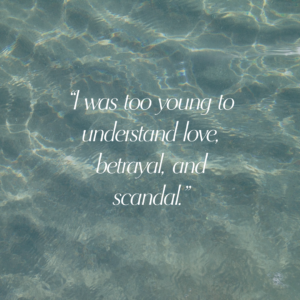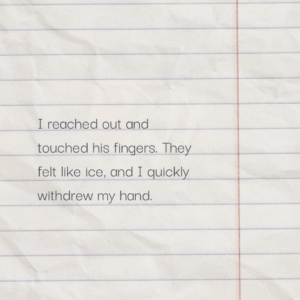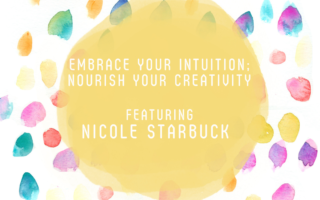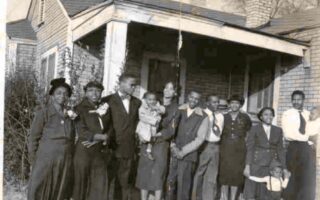Summer 1987
When I reflect on the summers of my youth, I remember swimming lessons and ice cream, bicycles, roller skates, plump strawberries, and Vacation Bible School, the sun’s warmth, and death’s chill.
 The former filled most of my days. Summer was the season of freedom–freedom from homework and early curfews. My brother and I could play outdoors and stay up past bedtime a little longer. Our faces basked in the television’s glow. Our fingers, slick with butter, plunged into popcorn. Our heavy eyelids promised us pleasant dreams. Life began on the last day of school.
The former filled most of my days. Summer was the season of freedom–freedom from homework and early curfews. My brother and I could play outdoors and stay up past bedtime a little longer. Our faces basked in the television’s glow. Our fingers, slick with butter, plunged into popcorn. Our heavy eyelids promised us pleasant dreams. Life began on the last day of school.
But the last day of second-grade school marked the end of life.
It was after school, and we were home. My brother and I played in the breakfast room while my mother watched television in the living room. The phone rang. She answered. Her voice and tears suddenly flooded the house. ”What do mean Junior’s been shot! Mama, what do you mean?” She jumped up from the sofa. “I’m on my way.” As she ran around the house, gathering her purse, coat, and kids, she repeated, “Please, God, not my brother! Please, God, don’t take my brother!”
She rushed us out the front door, around the corner, to my fraternal grandmother’s house. Through sobs, my mother tried to explain what happened: her brother–Junior–had been shot. And she was going to the hospital.
Granny asked, “Do you want me to drive you?”
“No, no, I have to go,” my mother raced to her car, leaving my brother and me bewildered and terrified on Granny’s doorstep.
Her brother, thirty-five years old, died that evening. I did not know him because he hardly spoke. He lived with my grandparents. I don’t know what he did for work, but I remember him tending the garden and pruning the lemon and orange trees.
My mother says he was rebellious in his younger years. He struggled socially, drank heavily, did drugs, argued with his parents, and smoked weed in his room while blasting John Coltrane on the record player. Junior had known his friend–Chipper–since they were kids. But shortly before his death, Junior had an encounter with Chipper’s girlfriend, who lived on the block. The nature of their encounter is still unclear to me. Some say she and Junior were sexually involved. Others say he threatened her life if she refused to sleep with him. Whichever story is true, one thing remains clear: Upon learning of their rendezvous, Chipper became enraged, paid a visit to my grandparent’s house, and shot Junior in the neck through his bedroom window. He then proceeded to walk around the house, shooting through doors and windows, intent to kill any witnesses. Miraculously, my grandparents walked away unharmed. And Chipper had escaped, eludinig law enforcement for years.
 I was too young to understand love, betrayal, and scandal. The details and gravity of Junior’s death didn’t blossom for me until my thirties, the summer of my life, the period after twenty-nine years of youthful spring. In my thirties, I began to feel the heat–the anger, passion, and disbelief of this tragedy–because life had revealed to me its underbelly. Up until then, I knew terrible things happened. But I didn’t comprehend the depth of bad things, the mechanics, the how and why. As far as I was concerned, certain people were bad seeds. Unbeknownst to me, each bad seed has a history, an invisible apparatus of memories, feelings, and stories extending through lifetimes. How long had my family’s story been a soap opera in which I played a minor character, an extra whose job was to add a touch of innocence to a scene? If coming of age is defined as the loss of innocence, then I didn’t come of age until the summer season of life, decades after Summer vacation in 1987 boiled away, leaving a scorched pot of evaporated tears.
I was too young to understand love, betrayal, and scandal. The details and gravity of Junior’s death didn’t blossom for me until my thirties, the summer of my life, the period after twenty-nine years of youthful spring. In my thirties, I began to feel the heat–the anger, passion, and disbelief of this tragedy–because life had revealed to me its underbelly. Up until then, I knew terrible things happened. But I didn’t comprehend the depth of bad things, the mechanics, the how and why. As far as I was concerned, certain people were bad seeds. Unbeknownst to me, each bad seed has a history, an invisible apparatus of memories, feelings, and stories extending through lifetimes. How long had my family’s story been a soap opera in which I played a minor character, an extra whose job was to add a touch of innocence to a scene? If coming of age is defined as the loss of innocence, then I didn’t come of age until the summer season of life, decades after Summer vacation in 1987 boiled away, leaving a scorched pot of evaporated tears.
My brother and I didn’t attend the funeral, but we did attend the viewing of the body a few days prior in a small funeral home on Vermont Avenue in South LA. When I saw Junior’s body lying in the casket, I felt a profound curiosity. I observed his closed eyelids and his three-piece suit. I had only ever seen him in tank tops and trousers when he was alive. I hadn’t been so close to a corpse, and I wanted to know what it felt like to touch one. I reached out and touched his fingers. They felt like ice, and I quickly withdrew my hand.
 Ten years after Junior’s death and seven years after we had moved in with our grandparents, Chipper was still on the run, nowhere to be found, until an FBI agent knocked on our front door. My mother answered. The agent said he believed Chipper was in the area. It turns out Chipper and his girlfriend, the same lady who still lived on the block, had a child together, and the FBI suspected he had been visiting his family. My mother hadn’t seen Chipper and was surprised that after all these years, he might have reappeared. As she talked, the FBI agent looked down the street and said, “I think that’s him.” He called for backup and jumped into his car. After leading law enforcement on a pursuit through the streets of LA, Chipper was arrested for murder while taking his child to school.
Ten years after Junior’s death and seven years after we had moved in with our grandparents, Chipper was still on the run, nowhere to be found, until an FBI agent knocked on our front door. My mother answered. The agent said he believed Chipper was in the area. It turns out Chipper and his girlfriend, the same lady who still lived on the block, had a child together, and the FBI suspected he had been visiting his family. My mother hadn’t seen Chipper and was surprised that after all these years, he might have reappeared. As she talked, the FBI agent looked down the street and said, “I think that’s him.” He called for backup and jumped into his car. After leading law enforcement on a pursuit through the streets of LA, Chipper was arrested for murder while taking his child to school.
Summer is the season of opportunity. If problems are opportunities for transformation, summer is also the season of discovery and excitement. It is the season when energy reaches its peak before cooling in the dusk of autumn. In summer, the seeds you planted in spring will either blossom or wither. It is the season of gold and blue beaches with frothy waves, of bird songs that warble through the blazing days and balmy nights. Summer is chocolate, vanilla, cherry, and strawberry ice cream dripping from waffle cones. It is the season when I have time to stop, observe, and reflect. Since I was a kid, my summers have meant freedom and vacation. And while many people toss and turn during hot, humid nights, my bed is a swimming pool on which I float. Cool, calm, renewed.


